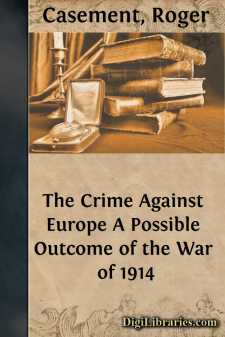History
- Africa 30
- Americas (North Central South West Indies) 50
- Ancient 68
- Asia 58
- Australia & New Zealand 8
- Canada 41
- Caribbean & West Indies 1
- Civilization 20
- Eastern Europe 12
- Europe 310
- Expeditions & Discoveries 60
- General 77
- Historical Geography 1
- Jewish 9
- Latin America 3
- Medieval 8
- Middle East 13
- Military 248
- Revolutionary 8
- Study & Teaching 5
- United States 353
- Western Europe 56
- World 13
History Books
Sort by:
PERSONALITY OF THE KAISER AND SOMETHING OF THE KING BUSINESS To the American mind the Kaiser is the personification of Germany. He is the arch enemy upon whom the world places the responsibility for this most terrible of all wars. I have sat face to face with him in the palace at Berlin where, as the personal representative and envoy of the President of the United States, I had the honor of expressing...
more...
by:
Katharine Blunt
CHAPTER I Wheat is as much a war necessity as ammunition—wheat is a war weapon. To produce it and distribute it where it is needed and in sufficient quantities is the most serious food problem of the Allied world. The continent of Europe, with her devastated fields, can raise but a small fraction of the wheat she needs, and ships are so few that she cannot import it from many of the usual sources....
more...
This is a reprint, somewhat amplified, of an article printed recently in the New York Times. The original article was written before the recommendations of the Ways and Means Committee of the House of Representatives were reported. In a time of patriotic exaltation and of universal obligation and readiness to make great sacrifices to bring a most just and righteous war to a successful conclusion, the...
more...
FOREWORD I am writing what should have been the last chapter of this book as a foreword because I want to bring home to our people the gravity of the situation; because I want to tell them that the military and naval power of the German Empire is unbroken; that of the twelve million men whom the Kaiser has called to the colours but one million, five hundred thousand have been killed, five hundred...
more...
by:
Roger Casement
INTRODUCTION. The reader must remember that these articles were written before the war began. They are in a sense prophetic and show a remarkable understanding of the conditions which brought about the present great war in Europe. The writer has made European history a life study and his training in the English consular service placed him in a position to secure the facts upon which he bases his...
more...
CHAPTER I PROBLEMS OF THE FUTURE The newspapers have lately been making large quotations from the poems of Mr. Rudyard Kipling. They might, if they had been so minded, have laid under similar contribution the Revelation of St. John the Divine. There, too, with all the imagery usual in Apocalyptic literature, is to be found a description of vague and confused fighting, when most of the Kings of the...
more...
Chapter I The Great War The call from Europe.—Friend against friend.—Why?—Death and devastation.—No private quarrel.—Ordered by government.—What makes government?—The influence of the past.—Four causes of war. Among the bricklayers at work on a building which was being erected in a great American city during the summer of 1914 were two men who had not yet become citizens of the United...
more...
PROLOGUE Though a lover of peace, Mr. Punch from his earliest days has not been unfamiliar with war. He was born during the Afghan campaign; in his youth England fought side by side with the French in the Crimea; he saw the old Queen bestow the first Victoria Crosses in 1857; he was moved and stirred by the horrors and heroisms of the Indian Mutiny. A little later on, when our relations with France...
more...
by:
W. C. C. Weetman
INTRODUCTION It is not only a great honour to have been asked to write an introduction to this book, but it is a real pleasure to me to be linked in this manner to a Battalion with which I was so intimately connected for nearly six years and in which I made so many friends, of whom many, alas, have passed the "great divide." The Battalion has been lucky in finding in Capt. Weetman an author...
more...
CHAPTER I MOBILIZATION AND MOVE TO FRANCE The Division mobilized with its Headquarters at Cork--two brigades in Ireland, namely, the 16th Infantry Brigade at Fermoy, and the 17th Infantry Brigade at Cork, and one Infantry Brigade--the 18th--at Lichfield. Divisional troops mobilized in Ireland. The order for mobilization was received at 10 p.m. on the 4th August 1914. On the 15th August units mobilized...
more...











